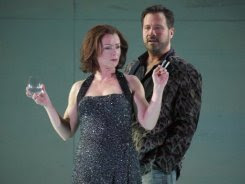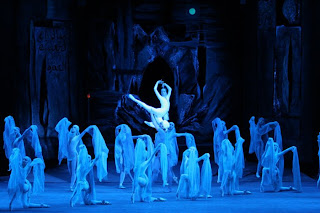


I've really never heard any Händel opera, so had no idea what to expect. As it turned out, even the opera itself is one of the least known. And I've went completely unprepared. The only thing I knew about the show is that Christine Schäfer is singing the lead and Pierre Audi is directing. Her being one of my favorite singers (after hearing her Cherubino in Slazburg production) and him making the stunning Amsterdam Ring production it didn't really take me long to buy the ticket.
The story seems to be very simple, and easy to follow, since as is it custom in barrock operas, the singers would repeat one and the same line more than twenty time, so eventually you got what they were singing. It's a story of a wealthy princess Partenope in love with Arsace, having two other suitors Emilio and Armindo trying to win her over. Arsace's former fiancé Rosmira dressed up as a guy tries to split up the two lover and win her Arsace back. At the end Partenope having a choice of three guys fighting for her is not able to decide which one she likes.
Audi placed the whole show somewhere on the contemporary Californian coast, in one of the 60's styled houses (absolutely fantastic sets by Patrick Kinmonth, with superb stage transformations) Partenope being a wealthy single women, bored by her life, constantly working with her personal trainer, having massage, pedicure or manicure done and throwing parties from nothing to do. It looks great, and it works even better.
Audi also plays a bit with the sexual ambiguity of the show itself. There is Arsace, Partenope's lover who is counter tenor, Armindo suitor another counter tenor, Emilio a lyrical tenor, and Rosmira girl dressed up as a man all wooing Partenope. And the only 'masculine' voiced role, Ormonte, Partenope's second hand, a baritone is a feminine bisexual. It looks strange, but works fantastic. And and a bit of a comical twist to the show.
For me the star of the show was Patricia Bardon in the role of Rosmira. I've never heard of her before, therefore even more was struck by her fabulous singing and great acting. I have no idea how a Händel voice should sound like, but for me her mezzo seemed perfect. Such beautiful phrasing and great coloratura. Enjoyed every single aria a lot. Christine Schäfer has a really extraordinary voice and what I liked the most about her (and it seems that's why her Cherubino works) is that she really amazingly manages to color all her phrases and tones. Her recitatives are on such level, that I could spend the whole night only listening to them. So are her "slow" arias. However, what did not work for me well, were her coloratura arias, somehow this isn’t her.
David Daniels - Arsace, seems to be one of the biggest countertenor star, and I've learned this only after the show and I definitely know why. I do have to say that for me this was the first live experience with counter tenors (and there were two), and it took me some time to get used to them. Especially to Daniels. I mean that guy looks like a real macho stud, and then suddenly you hear that high voice. My first reaction was to laugh. After some time I really got used to it, and started enjoying his singing enormously. Beautiful strong voice, with superb technique.
Other singers in slightly lesser parts were also on the high level and deserve full praise.
Sitting in the first row, just behind the conductor (Christophe Rousset) I've got a great close view of the stage and actors and really managed to appriciate the fantastic acting on part of them all. The only scary part was seeing Schäfer walking on those dangerously high heels on the slope just above the orchestra. Interesting was also following the orchestra itself, with a bunch of instruments I've seen for the first time.
I was really in a musical bliss for some 4 hours. Heavenly music with fantastic singing and playing, all put in beautiful production, that I've already decided to catch some other baroque shows as soon as possible
































Big.jpg)


